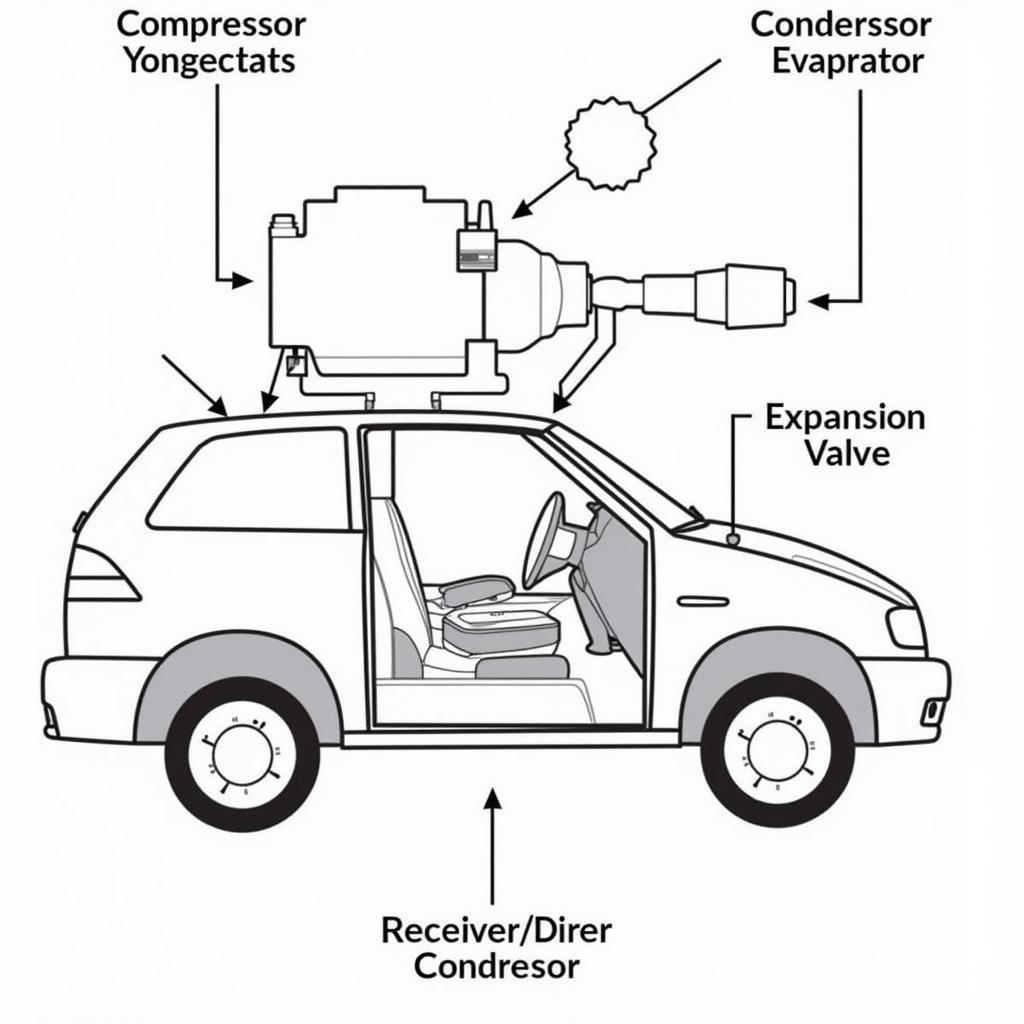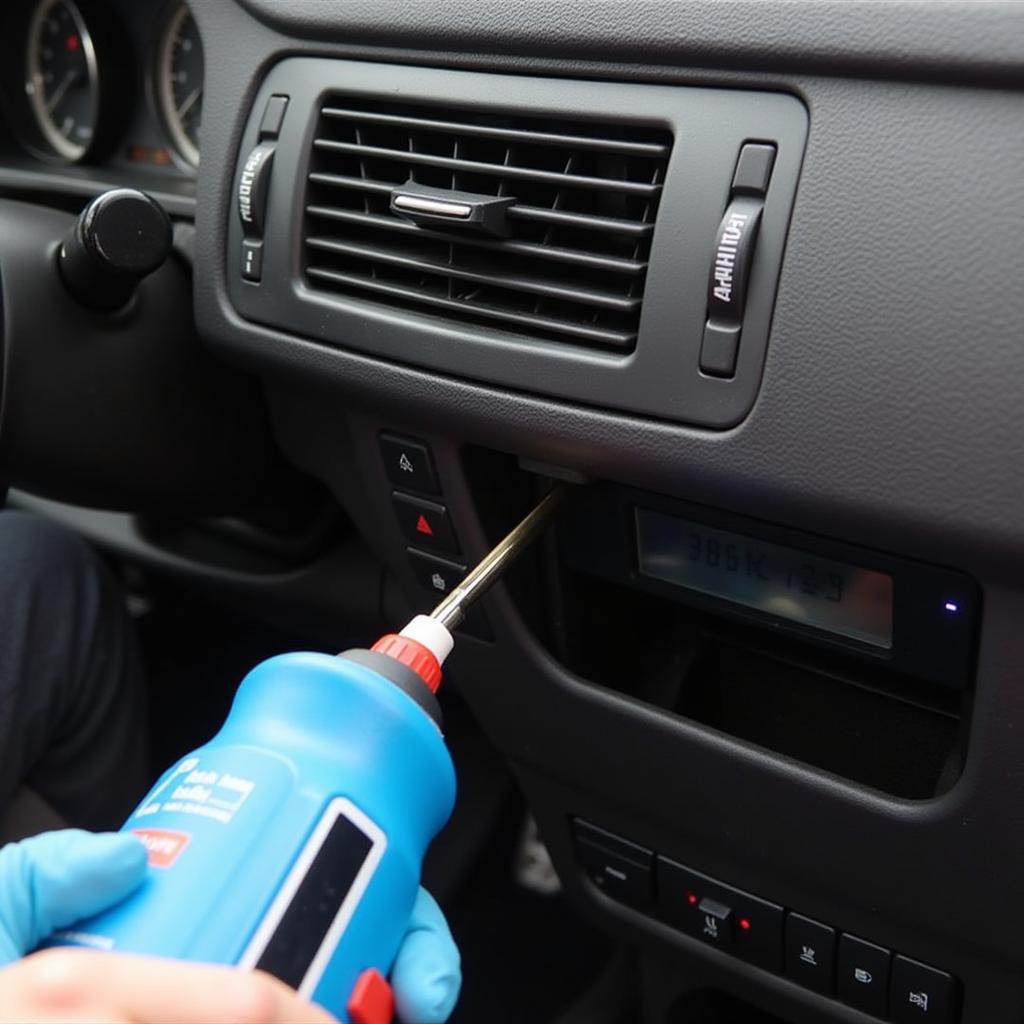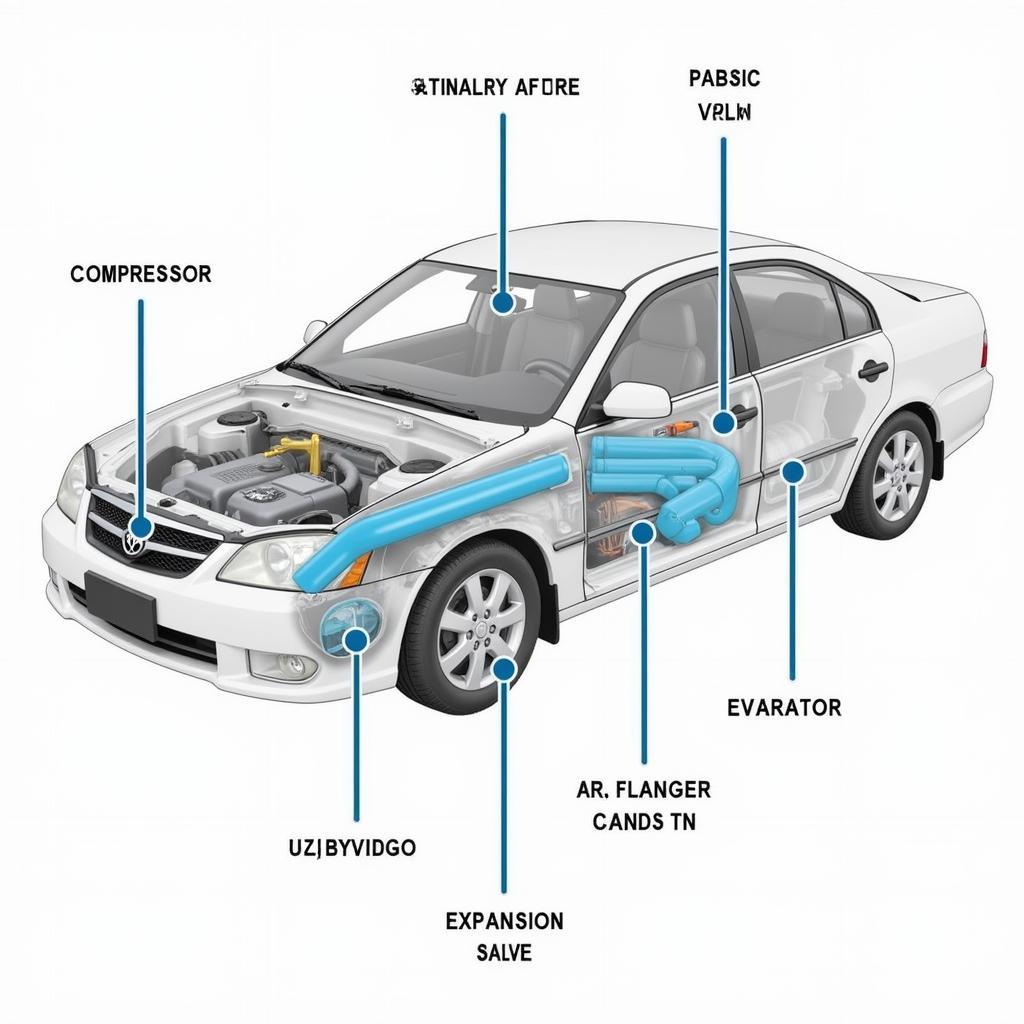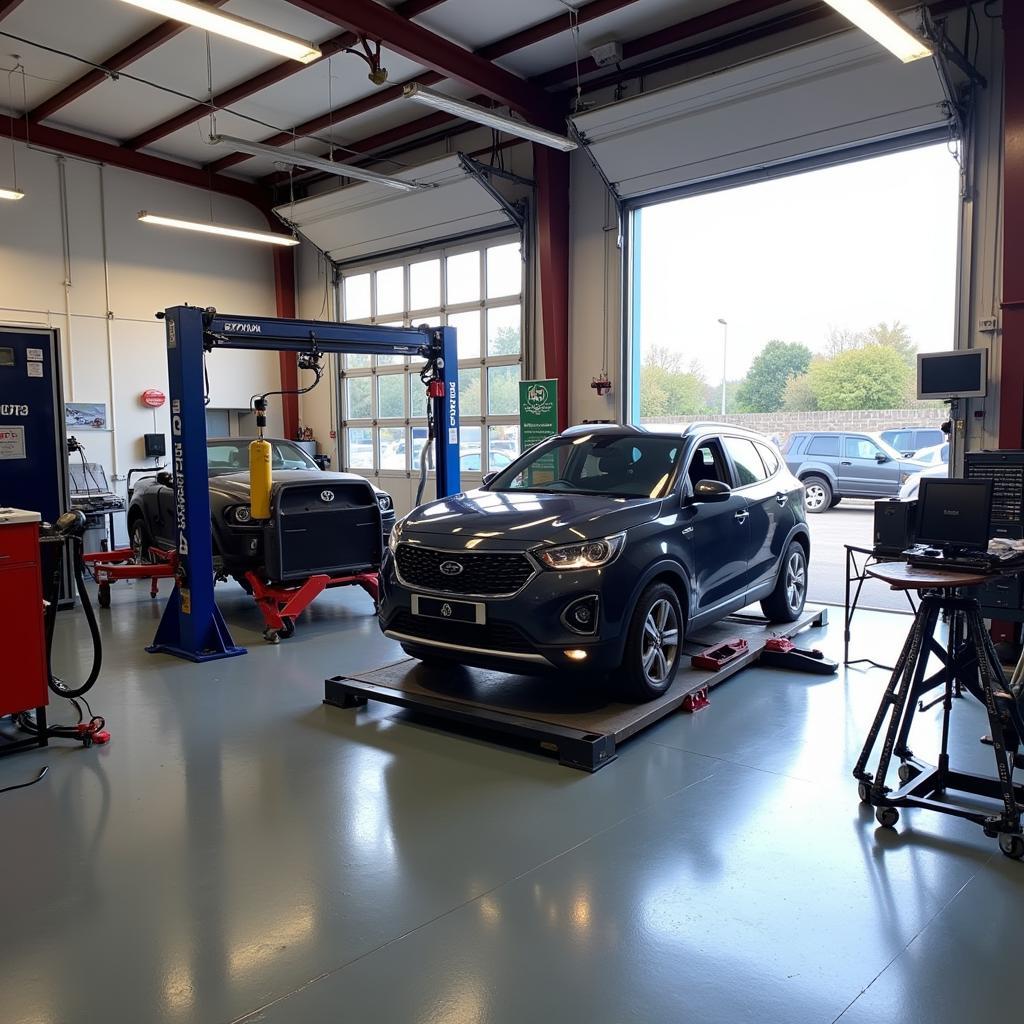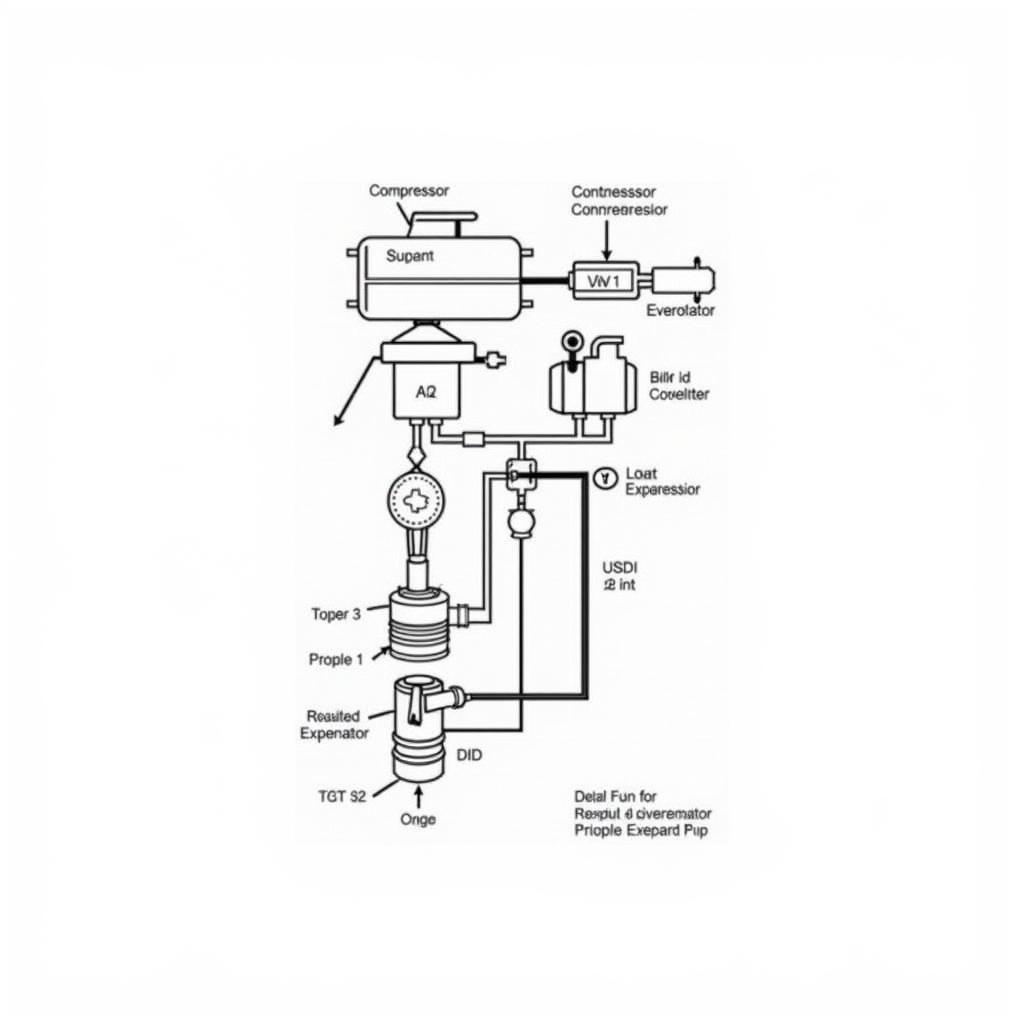
Car AC System Components Diagram
A malfunctioning car AC system can make driving uncomfortable, especially during hot weather. Finding and fixing an Air Conditioning Car Leak Repair is crucial for restoring cool air and ensuring a pleasant driving experience. This guide will explore the common causes of AC leaks, how to diagnose them, and the various repair options available. We’ll also discuss the importance of preventative maintenance and provide answers to frequently asked questions.
A leaky car AC system not only affects your comfort but can also lead to more serious problems if left unattended. Understanding the components of your AC system and how to identify potential leaks is the first step toward a solution. Let’s delve into the details. Learn how to diagnose car AC issues and find a reputable repair shop near you. For those in specific locations like Belfast or Glasgow, we have tailored resources available. You can check out our guide on car air conditioning repair belfast.
Understanding Your Car’s AC System
Your car’s AC system is a complex network of components working together to cool the air inside your vehicle. Key components include the compressor, condenser, evaporator, expansion valve or orifice tube, and refrigerant lines. Leaks can occur in any of these components or the connections between them.
Common Causes of AC Leaks
Several factors can contribute to leaks in your car’s AC system:
- Age and Wear: Over time, seals and hoses can deteriorate, leading to cracks and leaks.
- Corrosion: Exposure to moisture and road salt can corrode metal components, creating weak points prone to leaks.
- Physical Damage: Impacts from road debris or accidents can damage AC components and cause leaks.
- Manufacturing Defects: In some cases, leaks may be caused by faulty parts or improper installation.
 Car AC System Components Diagram
Car AC System Components Diagram
Diagnosing an AC Leak
Identifying the source of an AC leak can be challenging. Here are some common methods used to diagnose leaks:
- Visual Inspection: A thorough visual inspection of the AC components and connections can often reveal obvious leaks or signs of damage.
- Pressure Test: Using a specialized gauge, a technician can pressurize the system with nitrogen to check for leaks.
- Electronic Leak Detector: These devices can detect even small leaks by sensing refrigerant vapors.
- Dye Test: A fluorescent dye is added to the refrigerant, allowing leaks to be easily identified with a UV light.
Knowing the estimated car air conditioning leak repair cost can help you budget effectively.
AC Leak Repair Options
Depending on the location and severity of the leak, several repair options are available:
- Sealant: For small leaks, a sealant can be added to the refrigerant to seal the leak from the inside.
- Component Replacement: Damaged or corroded components, such as hoses, seals, or the compressor, may need to be replaced.
- O-ring Replacement: O-rings are small rubber seals that can become brittle and leak over time. Replacing these is a relatively simple and inexpensive repair.
Finding a reliable repair shop is essential for effective air conditioning car leak repair. Searching for car air conditioning leak repair near me can help you locate qualified technicians in your area.
Preventing AC Leaks
Regular maintenance can help prevent AC leaks and extend the life of your system:
- Regular Inspections: Have your AC system inspected annually by a qualified technician.
- Refrigerant Recharge: Ensure your system has the correct amount of refrigerant.
- Clean the Condenser: Keep the condenser fins clean to prevent overheating and damage.
You can also consider a car air conditioning leak repair kit for minor repairs.
Conclusion
Air conditioning car leak repair is essential for maintaining a comfortable driving environment. By understanding the causes of leaks, how to diagnose them, and the available repair options, you can ensure your AC system stays in top condition. Regular maintenance and prompt repairs can help prevent costly repairs down the road.
FAQ
- How often should I have my car’s AC system inspected? Annually.
- What are the signs of a low refrigerant charge? Warm air blowing from the vents, weak airflow, and hissing sounds.
- Can I repair an AC leak myself? Minor repairs may be possible with a DIY kit, but complex repairs should be handled by a professional.
- How much does an AC leak repair typically cost? Costs vary depending on the location and severity of the leak.
- How long does an AC leak repair take? Repair times can range from a few hours to a full day.
- What type of refrigerant does my car use? Check your owner’s manual or the sticker under the hood.
- How can I prevent AC leaks? Regular maintenance, including inspections and refrigerant recharges, is key.
Common AC Leak Scenarios
- Hissing Sound and Warm Air: This often indicates a refrigerant leak.
- Weak Airflow: This could be due to a leak or a clogged component.
- Oily Residue: Oil around AC components suggests a leak.
Further Resources
Check out our articles on car air conditioning repair in car air conditioning repair glasgow for location-specific information.
Need help with your car’s AC system? Contact us via WhatsApp: +1(641)206-8880 or Email: [email protected]. Our 24/7 customer support team is ready to assist you.

